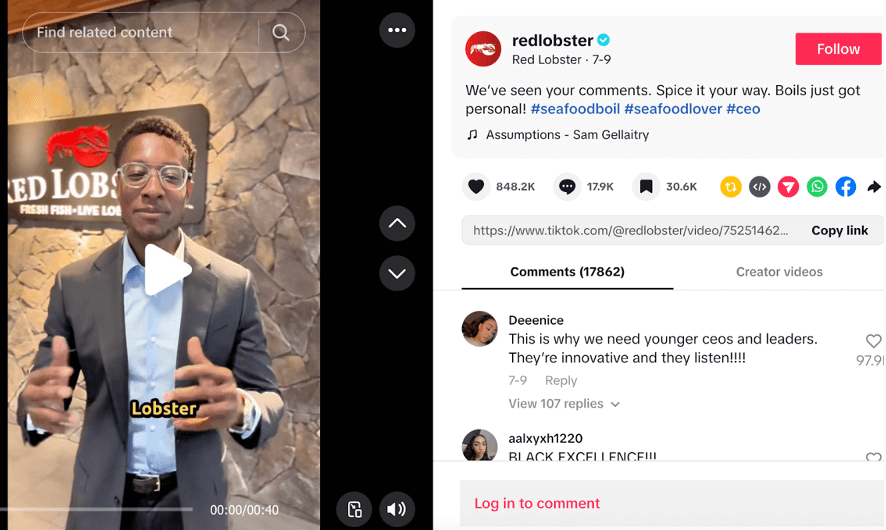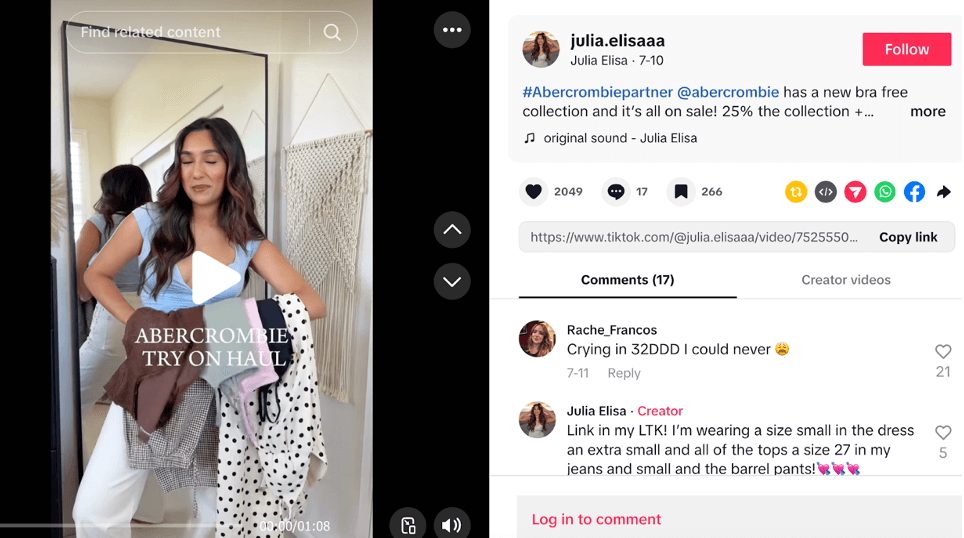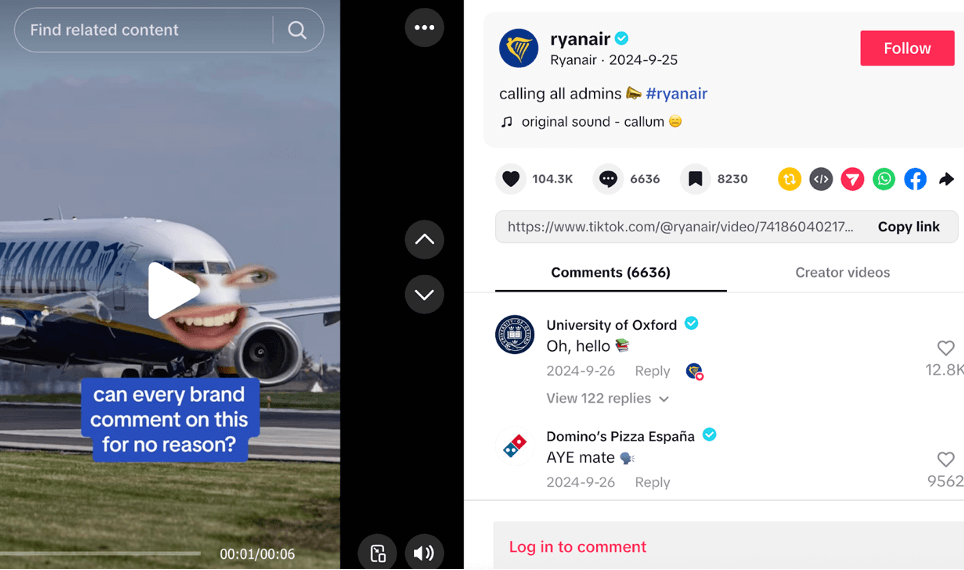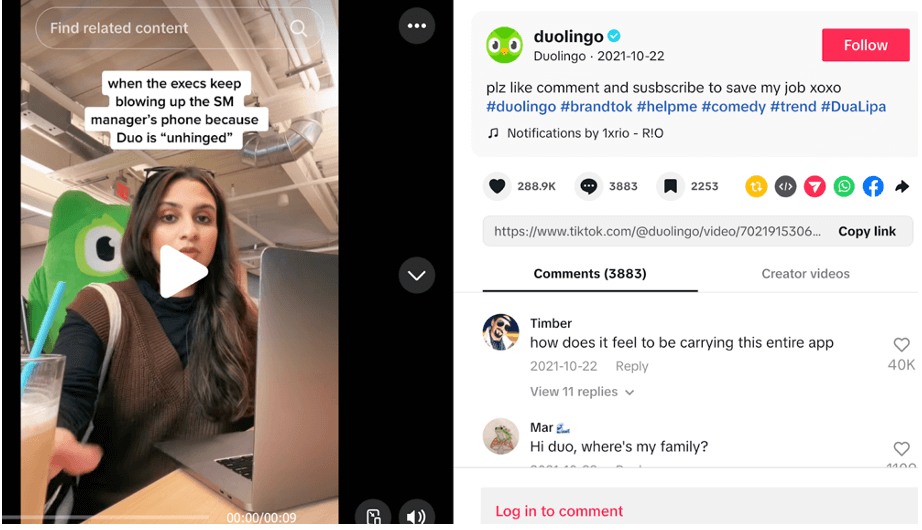TikTok SEO: The essential guide for brands in 2026

Table of Contents
TikTok has evolved far beyond a trend-driven app and has become a powerful go-to place for searching online for younger generations. It’s influencing social media users’ buying behavior and is becoming a foundational part of companies’ brand strategies.
With over a billion active users and part of the marketing buyer journey for countless brands, TikTok plays a central role in how people search for ideas, products and services.
If your brand is on TikTok, you need a well-rounded strategy to expand reach and engagement. This means, you will need to consider TikTok SEO, algorithmic trends and the nuances of resonating with your target audience’s searches through your TikTok content.
In this guide, we’ll break down what TikTok SEO is, the ranking factors that influence visibility and how to craft content that expands your contents’ reach and discoverability.
What is TikTok SEO?
TikTok SEO, or TikTok search engine optimization, refers to the practice of optimizing your TikTok posts so they are easily discoverable when users search within TikTok and in Google search results.
It’s about making sure your brand appears when people search for topics, keywords or hashtags relevant to what you have to offer. And, this means creating content that resonates but also aligns with how your brand’s target audience searches for TikTok content.
Why SEO on TikTok matters for your brand
Traditionally, SEO is associated with optimizing web content to rank higher in search results on platforms like Google and Bing. However, the concept of SEO is expanding beyond traditional search engines. Social media search is the new frontier, where search as a modality is now more commonly used within social networks themselves than ever before.
According to Sprout’s Q2 2025 Pulse Survey, Gen Z social media consumers turn to searching on social media before searching on Google and traditional search engines. Considering that TikTok is one of the most popular networks among Gen Z (76%) and younger millennials (59%), and that 41% of Millennials begin their search on TikTok, optimizing content for TikTok’s search ecosystem is an even greater necessity now.
Prioritizing TikTok SEO is important for brands to stay discoverable, relevant and competitive in a social-first search landscape.
What impacts TikTok content visibility
Like every social media network, TikTok also has its own algorithm. TikTok’s algorithm uses the same signals that push content onto the “For You” Page to also influence what appears in search results in-network. That’s why understanding what factors within TikTok’s algorithm contribute to your content appearing more to users is incredibly helpful when developing your TikTok SEO strategy.
So, what are the factors that get your content to pop up in TikTok’s algorithm more often? The platform prioritizes these key inputs:
User interactions
TikTok’s algorithm prioritizes content based on how users engage with the platform. This means, what consumers engage with most–or what they resonate with most–is what they will see more of.
These are the behavioral signals to help determine what TikTok content appears in users’ own “For You” feed and in-network search results:
- Videos watched to completion or rewatched
- Likes, shares and comments
- Content marked as “Not Interested”
- Search queries and accounts followed
Additionally, TikTok uses a user’s device and account settings, like language preferences or country, to fine-tune recommendations. The platform also gives users more control with personalization tools like topic frequency settings and keyword filters. Content moderation and safety signals also play a role, limiting visibility for repetitive, sensitive or age-restricted topics.
To get in front of your target audience, it is important to speak your audience’s language. To know what’s working and what’s not, start with what your own TikTok analytics tell you about your TikTok content’s level of engagement. This is a great place to get an idea of what kind of content engages your audience.
Technical TikTok SEO elements
Much like video SEO on other networks, there are opportunities to optimize your TikTok posts for more in-network visibility. The details you include in your posts provide valuable context for TikTok’s algorithm.
The following elements help the algorithm classify and surface your video to the users searching within TikTok:
- Caption with keywords in it
- Hashtags relevant to the video topic
- Sounds or music used
- On-screen text and video titles
7 TikTok SEO Tips to boost your content’s reach
Knowing what the algorithm looks for is one thing. Knowing how to create content that ranks is another. Keep these tips in mind when planning, creating and even publishing your TikTok video content to increase your chances of showing up in in-network search and the “For You” feed.
1. Conduct keyword research
Our content team conducts keyword research to pinpoint which web pages and blog posts make the most sense to create for our audience. And for social search, this is a foundational step in beginning to optimize your TikTok profile and TikTok posts for more discoverability in-network and in Google results.
Identify what you want to be known for in TikTok search
To get started, it’s best to identify the core product or service you want your brand to be known for. This will set you up for success to identify which core product or service keywords you want to make sure your TikTok profile and content is consistently showing up for.
For example, the skincare and haircare brand, Aveeno, shares a snippet of it’s offering in its TikTok bio: “The Power of Oat for Sensitive Skin. #Aveeno.” It includes “sensitive skin” as a keyword so it’s more easily discoverable by TikTok consumers on a search journey looking for content related to “sensitive skin.” Several of it’s posts also use the hashtag #SensitiveSkin, further optimizing the brand for this topical search intent.
There are a lot of different keywords and hashtags you could associate your brand with, and it requires analysis to find the ones most relevant to your products or services.
How to use tools to discover TikTok keywords
To discover the right keywords and hashtags for TikTok discoverability in-network requires maneuvering through a few tools and methods.
Some traditional SEO tools can be a great starting point. Tools like SEMrush and Ahrefs can help you get a general idea of what your target audience searches for on sites like Google to learn more about your industry or business.
You can also take advantage of TikTok’s Keyword Insights tool. This tool can help you find keywords, view relevant videos/ads and discover keyword phrases you can use in your captions.
Another great option is to use the TikTok app and its search engine yourself. Let’s say you’re managing the TikTok account for an online plant shop and care company. You might start with the basics, conducting a search on the TikTok app for “plant care.” TikTok’s search functionality will display a list of auto-populated results that other users are searching for:

You can also narrow down results even more by adding letters after your initial keyword request. Type out:
- Plant care a
- Plant care b
- Plant care c
And so on and so forth to see additional video ideas. Use the traditional SEO tools to find even more starting points for keywords you can input into TikTok’s search function.
Narrow down your top few core keywords and hashtags
As mentioned earlier, there are a lot of keywords and hashtags you can optimize your TikTok content for. But as you start a TikTok SEO strategy, what matters most are the keywords and hashtags you want your brand to show up for all the time.
Narrow down a list of the top few keywords and hashtags you want to make sure your TikTok content is visible for to get more awareness for your products or services.
The key to choosing the right ones is understanding search intent. Search intent is what a searcher intends to find when typing into the search bar. To know if these keywords and hashtags are going to be foundational for your TikTok SEO strategy, you need to analyze the search intent of the hashtags and keywords.
McCall Lanman, SEO Specialist at Sprout Social, breaks down how search intent relates in this context. “The content that appears in search results often reveals what the searchers, as they type in that keyword or hashtag, are looking for. It’s important to make sure the content you’re producing meets what searchers are intending to discover,” she says.
Did it seem like they wanted edutainment content? Did they want a “how-to” post? Did they want a user-generated, honest review about a product?
When you pick up on the theme of the content type that’s showing up for a keyword or hashtag, it shows you what type of TikTok posts to create to increase the likelihood of strong engagement and increased visibility for those hashtags or keywords.
McCall advises, “As you discern if a keyword or hashtag is the right one to go after, the golden question to ask yourself is ‘What did the searcher intend to find when typing in the keyword [or hashtag] and does my brand match with that type of content?’”
As you analyze search intent on TikTok, consider these important questions to verify your top few keywords and hashtags are right for your brand for TikTok SEO:
- Is the content presenting itself in these TikTok results for this keyword or hashtag highly relevant to my product or service?
- Does the content presenting itself in these TikTok results for this keyword or hashtag match with my existing TikTok content and branding?
- Is the style of the content in these TikTok results for this keyword or hashtag natural to repeat in my brand’s TikTok account?
2. Optimize your TikTok profile
A great TikTok profile is more than just a place for a brand’s videos; it’s a vital tool for boosting discoverability and bringing customers into the funnel. By optimizing your TikTok profile, you can help the algorithm (and potential customers) understand what your brand is all about, making it easier for people to find you.
Here’s a breakdown of how to optimize your brand’s TikTok profile for maximum discoverability:
Keep your username and handle name clear and consistent
For your brand’s username and handle, keep it clean, short and consistent with your official brand name across other social media platforms to support multi-channel recognition, like @Veja or @Brooklinen.
This may seem like a no-brainer, but your display name and handle are crucial for both brand recognition and SEO. Your level of clarity and consistency can also impact how well Google’s algorithm can identify if your TikTok account is associated with your brand, affecting your brand’s overall web visibility in traditional search engine results as well.
Your profile picture and branding, too, should stay consistent across all platforms. Use a clear, high-resolution logo that is instantly recognizable. Maintaining this consistent brand identity helps build trust and makes your account easy to find when people search for your company across different channels.
Align content and profile keywords
To build topical authority, ensure your bio keywords, hashtags and video captions all reinforce the same message. For instance, if your bio says “Athletic Greens,” your content should consistently use related hashtags like #AG1 and #DailyNutrition. This repetition signals to TikTok and Google exactly what you’re about, improving your chances of appearing for relevant searches.
Write a bio optimized for TikTok search
Think of your bio as a short, searchable description of your brand’s mission.
You can use your TikTok profile’s bio to optimize in more than one way. Here are a few quick ways that really work:
- You can use your primary keywords to describe your brand’s value proposition, for example, “The official home of handcrafted shoes for your daily commute.”
- Another great example is Mejuri’s bio. It reads, “Fine jewelry for every day” to signal its core product offering.
Secondary keywords and emojis can also help reinforce your brand’s identity and make the bio more engaging. You can also include a clear call-to-action, such as “Shop our new arrivals”, to encourage viewers to click your link and make a purchase.
Optimize your Link-in-Bio to turn TikTok search into conversions
The link in your bio is a crucial part of your profile’s SEO. Use it to direct traffic to your e-commerce site, a specific product page or an email newsletter signup. To make sure you’re providing a seamless buyer journey for your TikTok audience, ensure the landing page you’re linking to is optimized for the same keywords you want to rank for on TikTok.
3. Create high-quality TikTok content
According to TikTok, high-quality content sees follower growth over 40 times greater than with other posts. Plus, accounts that consistently post high-quality, niche content gain new followers up to three times more efficiently per video, says the network.
You also need to create content consistently. TikTok recommends publishing videos 1-4 times per day, especially when you’re testing out new content types to see what your audience engages with most. The best times to post on TikTok vary by industry but posting more content also increases your chances of going viral.
Even though TikTok videos lasting between 3 to 10 minutes get the most views, TikTok now enables you to create videos up to 60 minutes long in TikTok Studio. Optimize your video scripts to create compelling stories that captivate and inspire the audience. This is especially useful for brand storytelling and experimenting with different ideas when creating TikTok content.
Other ways to enhance your TikTok content include:
- Create specialized content to deliver valuable insights and tailored experiences that resonate with niche communities.
- Use TikTok’s editing features so the video feels native and familiar to your audience
- Incorporate trending sound clips and memes into your content
- Find a subculture your content and brand fit into
- Experiment with different types of videos, whether vertical or landscape, whatever fits your brand and style best.
- Dive into TikTok analytics and study your performance to refine your content strategy.
Pay attention to the videos that do well so you can try to replicate that success. Eventually, you should land on a formula that works for your brand and helps you get more followers.
4. Leverage trending challenges and hashtags
Another key to creating high-quality and engaging content that TikTok users want to see is to leverage trending challenges and hashtags. TikTok challenges have been a staple since the app’s beginning. Many of the top TikTokers earned their place by starting and participating in challenges, and your brand can do the same.
Brand challenges like Guess’s #InMyDenim challenge or Netflix’s #cobrakai challenge are great ways to make a splash on the app and reach a large audience. Plus, highly-used hashtags work in favour of your TikTok marketing strategy as they easily appear in search results, improving your SEO ranking.
However, as you decide which trends and challenges you want to hop on to, it’s important to ensure your content feels genuine to your brand. According to The 2025 Sprout Social Index ™, while 93% of consumers feel brands should keep up with online culture and trends, 32% say it’s embarrassing if a brand jumped on a trend blindly.
5. Use your keywords in your captions and videos
Include your video’s keyword(s) in your caption, hashtags and any on-screen text you add to your video. This can help solidify your video’s relevancy to your topic, improving your chances at appearing in search results.
However, your captions should still be engaging. Don’t keyword stuff. Instead, strategically place your keyword within a caption that helps tell more of a story for your video. Ask questions and try to get your viewers to leave comments. You can then use these comments to make more video content. Consider incorporating some of the keyword phrases you discovered using the Keyword Insights tool. Also, think about how your caption supports the overall tone and storytelling style of your video. It should be clear and feel authentic, as that will increase watch time and completion rates.
In addition, you should include 3-5 hashtags in your TikTok caption for maximum results. And at least one of those hashtags should include your keyword verbatim to help your video rank. Find relevant hashtags by looking at competitor accounts or influencers in your niche. You can also try out the TikTok Hashtags too to generate a few top hashtag options. Also consider using niche-specific emojis or formatting tricks, such as line breaks, to make your caption visually scannable. This is especially important for optimization for phones.
And finally, if you include on-screen text in your video (one of the many editing features available within the TikTok app), make sure at least one of your captions or text snippets includes your keyword. Using on-screen text or captions helps give the algorithm a better idea of what your video is about, but also helps with accessibility.
In addition to keywords, incorporate engaging on-screen elements like callouts, visual cues or subtle text overlays that reinforce your message without feeling forced. The key is to make every element feel native to TikTok’s fast-paced, visual-first format.
6. Engage with the TikTok community
Engage with your audience. Videos from active and legitimate accounts are much more likely to rank than inactive accounts that focus only on publishing and promoting.
There are several different ways to engage with your audience on TikTok, and encourage them to interact with your brand account as well.
One option is to go live. Live streaming is wildly popular on TikTok and can be a great way to showcase how things work behind the scenes for your followers and customers. Go live while you create or package products. Hold an “ask me anything” (AMA) or FAQ session to answer followers’ questions about your products or services. Talk to people who join and comment on your live video to help them feel involved.
Another option is to use your regular video content to encourage your viewers to leave comments, like your video and share it with their own friends or followers. TikTok comments can be leveraged in future content, so if nothing else, ask questions, poll your audience and find other ways to get viewers to leave their own comments.
You can then use those comments to create a new video. This type of content feels natural to your audience and can encourage them to cycle through past videos to see where the comments came from. This increases your views, showing TikTok that you have a popular account and people want to see your videos.
7. Collaborate with TikTok influencers
Finally, consider collaborating with TikTok influencers. To strengthen your TikTok SEO and increase brand visibility, partnering with creators who already have audience trust and algorithm momentum is a strategic move. Find popular TikTokers in your industry and reach out to them about a partnership. Tools like Sprout Social Influencer Marketing can also help you spot the right influencers for your brand based on brand fit and topical alignment.
Working with TikTok influencers makes it easier to get your brand in front of the right audience, grow your following and build trust fast. Influencers also help tap into relevant conversations as they often surface in “For You” feeds and search results. Plus, their use of targeted keywords, trending sounds and niche hashtags that feel authentic can amplify your discoverability far beyond what brand-led content alone can achieve.
It’s important to remember that having momentum on TikTok is not just about reach alone. It’s also about embedding your brand into the cultural and search patterns of the platform.
As networks like TikTok become your audience’s go-to search engines, social teams have a great opportunity to create content that’s not just relevant, but findable. Resources like our social search optimization workbook will enable you to flesh out your social strategy so you can guide your audience from search to discoverability.
TikTok SEO strategies that increase brand discoverability
Brands need to master TikTok SEO to boost visibility and connect with a wider audience. And as more B2B companies build a stronger social presence, fluency in TikTok SEO is becoming even more essential.
Some brands are already ahead of their peers. According to Jamia Kenan, Senior Social Media Specialist at Sprout, two companies that stand out in their use of TikTok SEO strategy in the B2B and B2C spaces are Red Lobster and Cisco, respectively.
We’ll discuss these and other real-world examples to see how brands are using proven TikTok strategies to increase discoverability and engagement.
Red Lobster
Red Lobster’s TikTok strategy is keyword-savvy and creator-friendly, two key ingredients for optimized brand visibility and engagement.
One of the ways the brand has catalyzed its comeback is by doubling down on a social strategy that prioritizes discoverability and appeals to a younger audience. Their strategy contains a smart mix of organic SEO tactics, UGC content and influencer partnerships to drive engagement and brand love through community-building.
“Red Lobster has had an overall resurgence on TikTok and overall business by growing their following to 130K and snapping back after filing for bankruptcy,” Kenan says.
“They use relevant keywords like #seafoodboil, #seafoodmuckbang, which are popular terms within social media, especially TikTok. They also use branded keywords like #RedLobster and #CheddarBayBiscuits. In addition, they often add subtitles on videos, repost UGC and work with creators and influencers,” she explains.
Red Loster CEO, Damola Adamolekun, also often appears in TikTok videos to connect with customers, engage with them and let them know that the brand is listening to their feedback. This lo-fi appearance makes the brand feel more genuine and human while ensuring they’re listening to what their customers are saying. The brand often tags his videos as #ceo.
Cisco
Cisco’s TikTok SEO strategy focuses on using a smart mix of branded and trending hashtags like #cisconetworking and #networkengineer to boost visibility and discoverability. They also use authentic, employee-generated content such as the #WeAreCisco and #LoveWhereYouWork, where employees participate in weekly TikTok “challenges” and share stories.
“Cisco also creates B2B content that appeals to niche communities on TikTok, like #TechTok. They also use keywords like #corporatehumor and #hybridwork to connect with a broader audience,” Kenan says. “Their edutainment video series is also very popular on TikTok, where they use subtitles and keywords to optimize their content for search,” she adds.
This clever strategy surfaces content in TikTok’s search and recommendation engine, amplifying brand visibility. It also humanizes the brand, connecting it with current and prospective talent in a trust-building, relatable way.
Abercrombie & Fitch
Abercrombie & Fitch has optimized its TikTok strategy to attract Gen Z audiences by tailoring content and feeds for TikTok SEO. The brand, “get ready with me” videos, try-on hauls and seasonal style edits, all lean into relatable, lifestyle-driven content that mirrors the aesthetics and tone of its audience. They’ve also roped in creators who use the #abercrombiepartner for UGC and catalyze engagement.
They boost discoverability and sustained high engagement by consistently using descriptive language, keyword-rich captions and engaging visuals that reflect popular search terms on TikTok.
“Abercrombie & Fitch is very consistent in their use of branded hashtags,” Kenan says. “I notice every post has #abercrombie, along with key brand hashtags like #abercrombiemens, #abercrombiewomens, as appropriate. For sales, they use #abecrombiecode, which demonstrates they understand search intent i.e. customers who look online for discount codes,” she adds.
The brand also takes advantage of trends, using relevant hashtags, such as the “you look happier trend”, according to Kenan.
This comprehensive SEO-optimized TikTok video strategy enables the brand to tap into Gen Z’s cultural pulse and re-establish itself as a trend-forward, inclusive fashion label.
Ryanair
Ryanair has built one of the most engaging airline presences on TikTok by leaning into its budget reputation with bold, self-deprecating humor. Using trending sounds, memes and its signature “plane face” filter, the brand turns common complaints into relatable, viral content. It often replies to comments with a cheeky tone or turns them into new posts, which helps drive ongoing engagement.
The brand consistently uses engaging captions and organically includes keywords, relevant hashtags like #budgettravel or #ryanair, and uses subtitles, as seen in this post, to prioritize accessibility and algorithm-friendly content. It also uses trending audio that aligns with what users are already searching or engaging with.
These tactics boost the brand’s visibility on both TikTok’s For You feed and search results, where users often look up airlines, travel hacks or flight memes.
Duolingo
Duolingo has built its TikTok SEO strategy with care. It combines cultural understanding with smart use of the algorithm, making videos about trending topics and humor that connects with Gen Z. Duolingo TikTok posts are discoverable through popular search terms, captions and hashtags.
It also uses SEO-friendly language like “language learning,” “Duolingo owl,” or trending phrases to rank in both TikTok’s For You feed and internal search results. This consistent, strategic optimization keeps their videos visible long after trends peak.
“The brand also blends cultural fluency with SEO use, as seen in the post below, where they use the tag #DuaLipa, which alludes to brand lore. Their mascot Duo loves the pop star and the brand later acknowledged this after his ‘death’,” Kenan says.
The owl’s fake death was part of the brand’s viral “unhinged” campaign, which made the Duo the Owl a funny, unpredictable character and aimed at increasing app engagement.
Similarly, Duolingo referenced Netflix’s famous serial Squid Game, blending social culture with searchable topics and captions to ensure people see and stay with the videos.
Duolingo’s TikTok strategy works so well because it combines smart SEO tactics with bold, original creativity. Their content is easy to find and hard to ignore—designed to rank in searches while keeping viewers entertained.
Start ranking with these TikTok SEO tactics today
All the examples above show that winning TikTok SEO is an achievable goal, especially when your strategy is customer-centric and you meet your audience where they are. Performing well on TikTok search also means you optimize for what your audience is searching for on TikTok.
Implement TikTok SEO tactics into your planning, creation and publication phases to maximize your reach and discoverability. Learn more about how seo and social media are beginning to work together to meet consumers across touch points within the search landscape.








Share